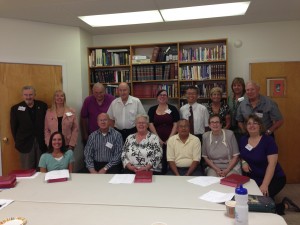Today Pastor Choi informs the audience what the Word of God, the Bible, says about creation: Who created the universe and everything in it? Based on his study of the Bible, he presents the following: 1. God makes an exclusive claim that it is He, no one else, who created the entire universe and all creatures in it. 2. A cloud of witnesses testify to the truth that God created the universe and everything in it. 3. The same God expects and commands God’s children to declare the same in worship and in faith. At the end, Pastor Choi urges the audience to make up their minds in believing God’s creation.
Following is a summary of the sermon:
Genesis 1:1 New American Standard Bible (NASB)
The Creation
1 In the beginning God created the heavens and the earth.
Introduction
I was born and raised in South Korea. I wasn’t a Christian until I was 17. I was educated in the public school system. I still remember the first time I was ever exposed to the evolution theory—in high school biology class. The textbook presented Darwin’s hypothesis on how all living things might have been evolved from one single living organism.
In the same textbook, no other theory besides Darwin’s was introduced. Just the evolution theory. Its argument was convincing. Showing a few pictures of embryos of different species such as fish, frog, bird, ape, human and so forth, especially in the very early stage, let’s say, a week or two weeks old ones, it pointed out that they look very much alike. Then, it deduced a theory that all these species share the common origin (otherwise, they wouldn’t look alike)—they come from the same parent—very likely from one single simple life form—amoeba! Over the next millions of years through natural selection, it argued, that simple life form evolved into more complicated life forms and branched out into many different life forms that make up the present world of plants, animals, and humans.
I must say, it was an interesting theory, and I was impressed. Then, I became a believer in Christ and started reading the Bible. Of course, right in the first page, Genesis 1:1 says, “In the beginning God created the heavens and the earth.” I never doubted that God has created all the creatures in every kind. Not that my faith was strong, but I just believed what the Bible says about creation.
Contents
Over the years, I always had a puzzling question in my mind regarding creation: Why is it so hard for some believers in the Church to believe as I do? That God has created the entire universe (heavens, earth) and everything in it including humans.
There can be several answers to the question, but the following three come to my mind:
- Some folks don’t believe that God has created all things, because they follow the crowd: they blindly follow the crowd in the world without a critical thinking. Since many believe in evolution, they reason, let’s go with the crowd.
- Some other folks, claiming that they are “scientifically minded,” don’t believe in God’s creation. They rather believe in evolution. They follow the arguments based on scientific discoveries establishing their own convictions on tangible, concrete, and visible evidence such as fossils, bones, skeletons, and even DNA.
- Other folks doubt that God has created them all, because they are ignorant of the Word of God (the Bible). They don’t read the Bible. Neither they study or research this topic looking into the Bible. They doubt God’s power. Based on a few negative comments they heard on creationism (such as how can God create everything in six days? It is impossible! Or, the age of the earth is billions of years according to science, yet, why some scholars say a few thousand years—unbelievable!), they reject God’s claims on creation in the Bible.
My intention this morning is not to prove how wrong the evolution theory is but to educate and inform God’s people of what the Bible says about creation: Who created the universe and everything in it? I pray that the Lord would open your heart and mind to listen to the Word of God the Bible on this subject.
What does the Bible say about creation?
The following three things:
1. It is God, no one else, who created everything in the world for His glory and by His will. God makes an exclusive claim on that. For instance, in Isaiah 45:8, God declares, “I have created it.” In Job 38:4, He declares to Job, “Where were you when I laid the foundation of the earth?” The Bible repeatedly says that God created all the creatures for His pleasure and for His glory (Isaiah 43:7, Colossians 1:16).
In fact, there are scores of references on God’s creation: from the very first page of the Bible (Genesis 1) to the last page (Revelation 22). He created light and darkness (Isaiah 45:7), heavens and earth (Genesis 1:1), waters (Genesis 1:9-10), vegetation/plants/trees (Genesis 1:11-12), sun/moon/stars (Genesis 1:15-18), sea creatures (Genesis 1:21-22), animals and humans (Genesis 1:23-30) and so forth.
God’s exclusive claim on creation also shows in His title: God has many titles such as God (El), LORD (Yahweh–YHWH), Yahweh Jireh (the LORD who provides), Yahweh Rapha (the LORD who heals), God the Almighty (El-Shaddai), God the LORD, God Most High (El-Elyon), LORD of hosts (Yahweh Zebaot), and so forth. Here’s one more title that He never intends to share with any other gods: Creator (הקֹנֵ֖) of Heaven and Earth (Genesis 14:19, 22).
One more note: There are three Hebrew verbs that are used in the context of God’s creation: אבָּרָ֣ (create), השֶׂ֥עֲ (make) and הקֹנֵ֖ (possess, buy, acquire—God originated and created heaven and earth, therefore, He owns them. E.g. Like an inventor who has 100% right to his inventions). These three words leave no room for any speculation that we are a product of random chance/accident. Indeed, we are created by God for God’s glory. We are connected to the Creator and we owe our life and existence to Him.
2. There’s a cloud of witnesses who would testify to the same truth that God created them all. In the Old Testament, we have Melchizedek the King of Salem and Abram (not Abraham yet) who called God Most High Creator of Heaven and Earth—Genesis 14:19,22. Prophet Isaiah declared, “God created them all, brings out their host and numbers them, calling them all by name” (Isaiah 40:26). Another prophet Malachi said, “Did not one God create us?” (Malachi 2:10) King Solomon even once said, “Remember your creator” (Ecclesiastes 12:1).
In the New Testament, our Lord Jesus said, “In the beginning of the creation, God made them male and female” (Mark 10:6). Apostle John said in Revelation 10:6, “God created heaven, the earth, and the sea, and what’s in them.” Paul the apostle said, “God created all things” (Ephesians 3:9). I didn’t even mention angels and countless believers. Every single one of these witnesses would testify even to the point of death that it is indeed God who created everything in the universe. For thousands of years, all God’s people consistently and faithfully shared the same conviction.
This time, let’s consider witnesses for evolution: Charles Darwin, Thomas Henry Huxley (a.k.a. Darwin’s Bulldog), communists, atheists, many scientists, naturalists (nothing beyond what you see), and people in academia. These witnesses are not comparable to the witnesses for God’s creation for the following reasons: They can change their theories and convictions any time whenever new evidence comes out. Next, the evolution theory has been around only 150 years. Who knows how long it will last? Finally, I am not sure how many of the followers would risk their own lives for their beliefs.
3. God expects/commands us His followers to declare in worship and in faith that He is indeed the Creator of all. In Revelation 4:11, we witness the heavenly worship where four living creatures (angels with six wings) and twenty-four elders fall before God, cast their crowns before the throne, saying, “Worthy are you, our Lord and God, to receive glory and honor and power, for you created all things….”
Based on these three discoveries in the Word of God, I am more convinced than ever before that it is God who created everything in the world. We are God’s creation with purpose: He wants us to enjoy Him and to bring glory to Him through our lives.
Make up Your Mind
It is time that we made up our minds. It is time that we stopped being double-minded in following God’s truth on creation. It is time that we stopped kidding ourselves. It is time that we stopped standing on both fences. It is about time that we paid a serious attention to God’s claims on creation.
I made up my mind this way: I do believe that God has created all things with purpose and by His will. I do believe so, not because of all the evidence but because of the integrity of all the witnesses and because of the authority of God’s Word. I believe in God’s creation because I believe in God who never lies. I believe in God’s creation because of the Word of God, the never-changing truth.
As much as I believe in Jesus’ redemption, I do believe in God’s creation. As much as I believe in Jesus’ resurrection, I do believe in God’s creation. As much as I believe in God’s love, I also believe in His creation. As much as I believe in eternal life, I do believe in God’s creation. As much as I believe in Heaven, I do believe in God’s creation.
Conclusion
Ask yourself: Does God ever lie? (That’s one thing God cannot do).
Is the Bible the Word of God to you? If so, believe His claims on creation. Believe that He created the universe and everything in it especially you for His glory and honor. He has a purpose for you. You are not an accident or a by-product of evolution. You are God’s child. You are wonderfully and fearfully created by God. He originated you, created you, and therefore, He declares to you, “You are Mine!” He knows you and calls you by name. You’re God’s creation. Give Him the glory.
Let us pray.






















